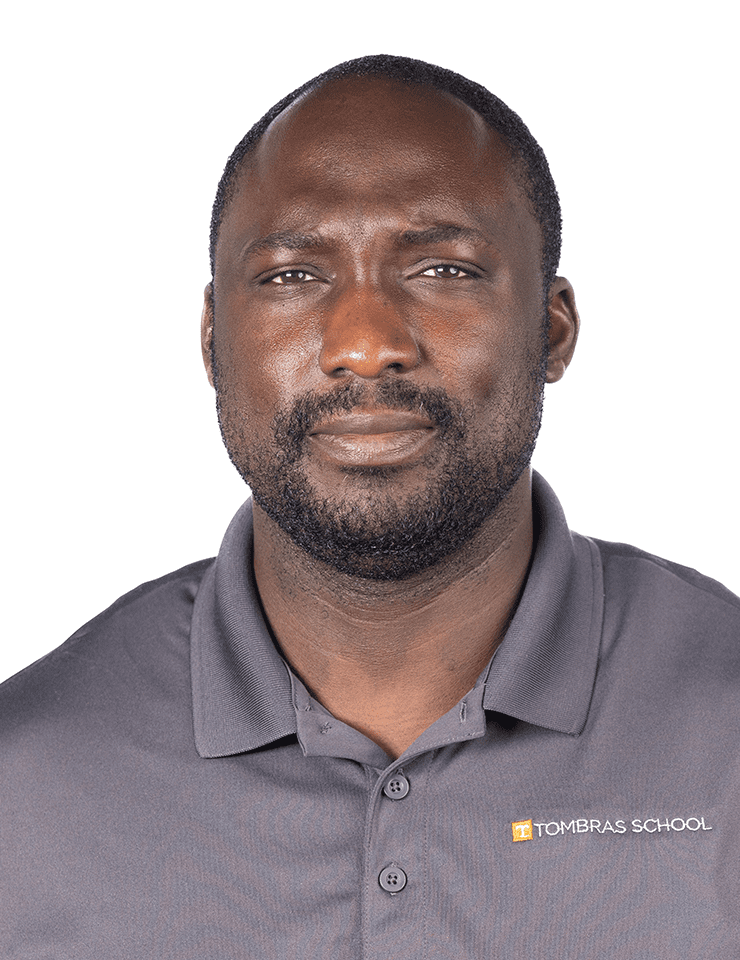Originally from Nigeria, Assistant Professor Oluseyi Adegbola found his passion for teaching while watching his father connect with his students in the classroom as a college professor.
“After school I would go to his office, and sometimes he would be teaching. Out of curiosity, I would wander into the class and watch him teach, and it was very conversational. It didn’t feel like formal instruction in the sense of sitting rigidly in class. It felt like he was having a conversation. There was plenty of humor. It was fun, and I thought, ‘I would like to do this’,” Adegbola said.
Adegbola received his bachelors in mass communication and worked for several publishing houses in Nigeria before moving to the United States to pursue his masters in communication at the University of Nebraska Omaha and PhD in media and communication from Texas Tech University.
Adegbola taught at DePaul University in Chicago for three years before moving to Tennessee to work at the Tombras School of Advertising and Public Relations.
Tombras School Director Beth Foster said, “Dr. Adegbola brings a sharp research mind, eager willingness to serve, and inspirational devotion to the classroom to the Tombras School faculty. He is beloved by students and colleagues alike, and he has contributed significantly in every aspect well above and beyond my expectations of faculty.”
Adegbola expresses that his interest in ethical and political marketing and public relations comes from his time in Nigeria.
“Growing up, I experienced scenarios where it was obvious that certain types of political behaviors like protest or even the use of violence was clearly connected to some kind of media speeches or calls for violence from prominent people. I think that was where I started thinking about political behavior and how that’s linked to the messages that people get from the media,” he said. “The more I started moving toward public relations, especially in my research, I started thinking about how public relations factors in for individuals and for organizations, whether they are political parties or Super PACs, during campaign season where political candidates use different types of messaging, rhetoric, or public relations strategy to elevate their profile.”
Adegbola is currently working on several projects.
He said, “My dissertation chair in school had this funny thing, but I found it helpful. He calls it the rule of five, and he would say you should always have five studies that are currently under review and five that you are working on and preparing to send out. It’s kind of a tall order to keep up with, but I find that it helps me to be on my toes and not get to a point where I don’t have anything on my plate. That would be a scary place to be for me.”
One of his projects currently under review deals with public relations ethics.
He explained, “It looks at how public relations professionals deal with ethical challenges in a different kind of space, which is in Nigeria. So there are cultural differences, and there are economic differences where you have many journalists being paid very little or not being paid at all.”
Adegbola says that, in many cases, public figures and those in power bribe public relation professionals to create publications. Those publications are sometimes true but other times can be distributing false information that is meant to cause fear. It is up to the professionals to take the bribe or not. To his surprise, Adegbola found that many do take the bribe instead of saying no and actually exploit the practice to get as much coverage and leverage as they can.
One of Adegbola’s current studies deals with how politicians experience scandal and how they use messaging to repair their images.
“There’s been a lot of research looking at how the quantity of coverage that’s given to scandals varies across different types of media and how that shapes how much attention people pay to the scandals. There’s not as much [research] looking at the different ways in which a scandal is framed. How a scandal is framed shapes how people think about who’s responsible and who’s to blame.”
Adegbola says, whether it’s politics or another topic that interests his students, he wants them to think critically about the things that engage them.
“Whether it’s discussing ethical dilemmas in public relations, or whether it’s thinking about research and strategy in the campaigns class, just think critically and then find ways to apply that critical thinking.”
He adds, “My best advice would be for them to not do the minimum. It’s interesting the things you can learn outside of the classroom if you’re just willing to get out of your comfort zone a little bit.”

